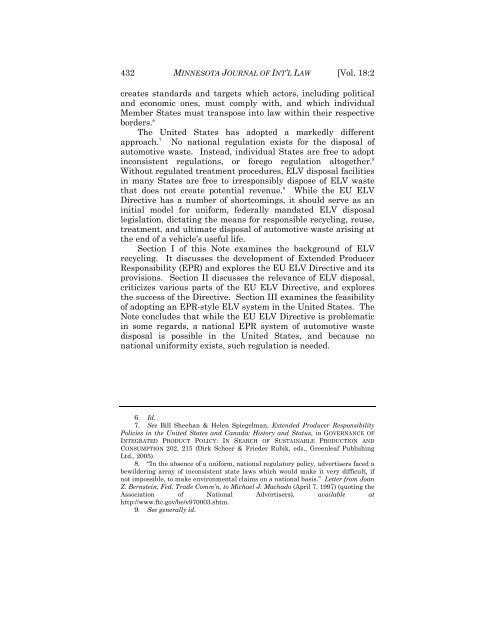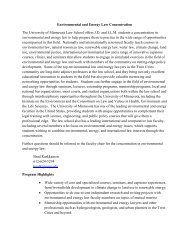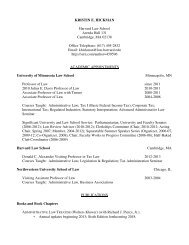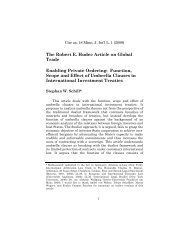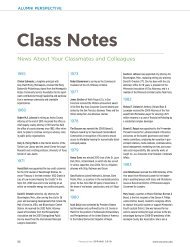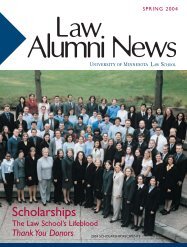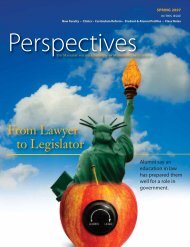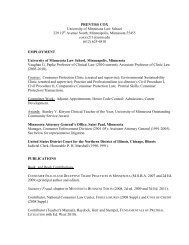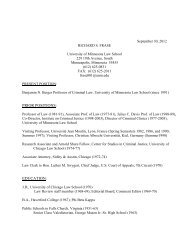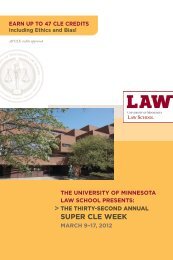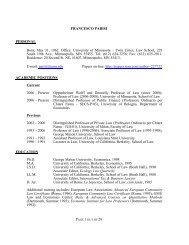The End-of-Life Vehicle (ELV) - the University of Minnesota Law ...
The End-of-Life Vehicle (ELV) - the University of Minnesota Law ...
The End-of-Life Vehicle (ELV) - the University of Minnesota Law ...
Create successful ePaper yourself
Turn your PDF publications into a flip-book with our unique Google optimized e-Paper software.
432 MINNESOTA JOURNAL OF INT’L LAW [Vol. 18:2<br />
creates standards and targets which actors, including political<br />
and economic ones, must comply with, and which individual<br />
Member States must transpose into law within <strong>the</strong>ir respective<br />
borders. 6<br />
<strong>The</strong> United States has adopted a markedly different<br />
approach. 7 No national regulation exists for <strong>the</strong> disposal <strong>of</strong><br />
automotive waste. Instead, individual States are free to adopt<br />
inconsistent regulations, or forego regulation altoge<strong>the</strong>r. 8<br />
Without regulated treatment procedures, <strong>ELV</strong> disposal facilities<br />
in many States are free to irresponsibly dispose <strong>of</strong> <strong>ELV</strong> waste<br />
that does not create potential revenue. 9 While <strong>the</strong> EU <strong>ELV</strong><br />
Directive has a number <strong>of</strong> shortcomings, it should serve as an<br />
initial model for uniform, federally mandated <strong>ELV</strong> disposal<br />
legislation, dictating <strong>the</strong> means for responsible recycling, reuse,<br />
treatment, and ultimate disposal <strong>of</strong> automotive waste arising at<br />
<strong>the</strong> end <strong>of</strong> a vehicle’s useful life.<br />
Section I <strong>of</strong> this Note examines <strong>the</strong> background <strong>of</strong> <strong>ELV</strong><br />
recycling. It discusses <strong>the</strong> development <strong>of</strong> Extended Producer<br />
Responsibility (EPR) and explores <strong>the</strong> EU <strong>ELV</strong> Directive and its<br />
provisions. Section II discusses <strong>the</strong> relevance <strong>of</strong> <strong>ELV</strong> disposal,<br />
criticizes various parts <strong>of</strong> <strong>the</strong> EU <strong>ELV</strong> Directive, and explores<br />
<strong>the</strong> success <strong>of</strong> <strong>the</strong> Directive. Section III examines <strong>the</strong> feasibility<br />
<strong>of</strong> adopting an EPR-style <strong>ELV</strong> system in <strong>the</strong> United States. <strong>The</strong><br />
Note concludes that while <strong>the</strong> EU <strong>ELV</strong> Directive is problematic<br />
in some regards, a national EPR system <strong>of</strong> automotive waste<br />
disposal is possible in <strong>the</strong> United States, and because no<br />
national uniformity exists, such regulation is needed.<br />
6. Id.<br />
7. See Bill Sheehan & Helen Spiegelman, Extended Producer Responsibility<br />
Policies in <strong>the</strong> United States and Canada: History and Status, in GOVERNANCE OF<br />
INTEGRATED PRODUCT POLICY: IN SEARCH OF SUSTAINABLE PRODUCTION AND<br />
CONSUMPTION 202, 215 (Dirk Scheer & Frieder Rubik, eds., Greenleaf Publishing<br />
Ltd., 2005).<br />
8. “In <strong>the</strong> absence <strong>of</strong> a uniform, national regulatory policy, advertisers faced a<br />
bewildering array <strong>of</strong> inconsistent state laws which would make it very difficult, if<br />
not impossible, to make environmental claims on a national basis.” Letter from Joan<br />
Z. Bernstein, Fed. Trade Comm’n, to Michael J. Machado (April 7, 1997) (quoting <strong>the</strong><br />
Association <strong>of</strong> National Advertisers), available at<br />
http://www.ftc.gov/be/v970003.shtm.<br />
9. See generally id.


